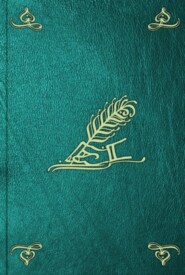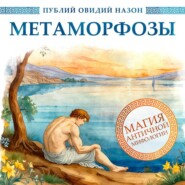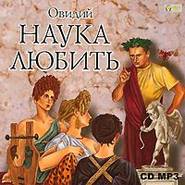По всем вопросам обращайтесь на: info@litportal.ru
(©) 2003-2024.
✖
The Amores; or, Amours
Настройки чтения
Размер шрифта
Высота строк
Поля
574 (return (#x5_x_5_i27))
[ Alpheus.—Ver 29. See the story of Alpheus and Arethusa, in the Fifth Book of the Metamorphoses, 1. 576.]
575 (return (#x5_x_5_i27))
[ Creüsa.—Ver. 31. Creüsa was a Naïad, the mother of Hypseas, king of the Lapithae, by Peneus, a river of Thessaly. Xanthus was a rivulet near Troy. Of Creüsa being promised to Xanthus nothing whatever is known.]
576 (return (#x5_x_5_i27))
[ The be beloved by Mars.—Ver. 33. Pindar, in his Sixth Olympic Ode, says that Metope, the daughter of Ladon, was the mother of live daughters, by Asopus, a river of Boeotia. Their names were Corcyra, Ægina, Salamis, Thebe, and Harpinna. Ovid, in calling her Thebe, probably follows some other writer. She is called 'Martia,' because she was beloved by Mars, to whom she bore Evadne.]
577 (return (#x5_x_5_i27))
[ Hand of Hercules.—Ver. 36. For the contest of Hercules and Achelous for the hand of Deianira, see the beginning of the Ninth Book of the Metamorphoses.]
578 (return (#x5_x_5_i27))
[ Calydon.—Ver. 37. Aeneus, the father of Meleager and Dei'anira, reigned over Ætolia, of which Calydon was the chief city.]
579 (return (#x5_x_5_i27))
[ The native spot.—Ver. 40; He alludes to the fact of the source or native country of the Nile being then, as it probably still is, quite unknown.]
580 (return (#x5_x_5_i27))
[ Daughter of Asopus.—Ver. 41. Evadne is called 'Asopide,' from her mother being the wife of Asopus. See the Note on line 33 above.]
581 (return (#x5_x_5_i27))
[ Enipeus dried up.—Ver. 43. Probably the true reading here is 'fictus,' 'the false Enipeus.' Tyro was the daughter of Salmoneus, king of Pisa, in Elis. She being much enamoured of the river Enipeus, Neptune is said to have assumed his form, and to have been, by her, the father of Pelias and Neleus.']
582 (return (#x5_x_5_i28))
[ Argive Tibur,—Ver. 46. Tibur was a town beautifully situate in the neighbourhood of Home; it was said to have been founded by three Argive brothers, Tyburtus, Catillus, and Coras.]
583 (return (#x5_x_5_i28))
[ Whom Ilia.—Ver. 47. Ilia was said to have been buried alive, by the orders of Amulius, on the banks of the river Tiber; or, according to some, to have been thrown into that river, on which she is said to have become the wife of the river, and was deified. Acron, an ancient historian, wrote to the effect that her ashes were interred on the banks of the Anio; and that river overflowing, carried them to the bed of the Tiber, whence arose the story of her nuptials with the latter. According to one account, she was not put to death, but was imprisoned, having been spared by Amulius at the entreaty of his daughter, who was of the same age as herself, and at length regained her liberty.]
584 (return (#x5_x_5_i28))
[ Descendant of Laomedon.—Ver. 54. She was supposed to be descended from Laomedon, through Ascanius, the son of Creüsa, the granddaughter of Laomedon.]
585 (return (#x5_x_5_i28))
[ No white fillet.—Ver. 56. The fillet with which the Vestals bound their hair.]
586 (return (#x5_x_5_i29))
[ Am I courted.—Ver. 75. The Vestais were released from their duties, and were allowed to marry if they chose, after they had served for thirty years. The first ten years were passed in learning their duties, the next ten in performing them, and the last ten in instructing the novices.]
587 (return (#x5_x_5_i30))
[ Did she throw herself.—Ver. 80. The Poet follows the account which represented her as drowning herself.]
588 (return (#x5_x_5_i32))
[ To some fixed rule.—Ver. 89. 'Legitimum' means 'according to fixed laws so that it might be depended upon, 'in a steady manner.']
589 (return (#x5_x_5_i33))
[ Injurious to the flocks.—Ver. 99. It would be 'damnosus' in many ways, especially from its sweeping away the cattle and the produce of the land. Its waters, too, being turbid, would be unpalatable to the thirsty traveller, and unwholesome from the melted snow, which would be likely to produce goitre, or swellings in the throat.]
590 (return (#x5_x_5_i33))
[ Could I speak of the rivers.—Ver. 103. He apologizes to the Acheloüs, Inachus, and Nile, for presuming to mention their names, in addressing such a turbid, contemptible stream.]
591 (return (#x5_x_5_i123))
[ After my poems.—Ver. 5. He refers to his lighter works; such, perhaps, as the previous books of his Amores. This explains the nature of the 'libelli,' which he refers to in his address to his mistress, in the Second Book of the Amores, El. xi. 1. 31.]
592 (return (#x5_x_5_i124))
[ His wealth acquired.—Ver. 9. 'Censu.' For the explanation of this word, see the Fasti, B. i. 1. 217, and the Note to the passage.]
593 (return (#x5_x_5_i124))
[ Through his wounds.—Ver. 9. In battle, either by giving wounds, or receiving them.]
594 (return (#x5_x_5_i124))
[ Which thus late.—Ver. 15. By 4 serum,'he means that his position, as a man of respectable station, has only been recently acquired, and has not descended to him through a long line of ancestors.]
595 (return (#x5_x_5_i124))
[ Was it acquired.—Ver. 20. This was really much to the merit of his rival; but most of the higher classes of the Romans affected to despise anything like gain by means of bodily exertion; and the Poet has extended this feeling even to the rewards of merit as a soldier.]
596 (return (#x5_x_5_i125))
[ Hold sway over.—Ver. 27. He here plays upon the two meanings of the word 'deducere.' 'Deducere carmen' is 'to compose poetry'; 'deducere primum pilum' means 'to form' or 'command the first troop of the Triarii.' These were the veteran soldiers of the Roman army, and the 'Primipilus' (which office is here alluded to) being the first Centurion of the first maniple of them, was the chief Centurion of the legion, holding an office somewhat similar to our senior captains. Under the Empire this office was very lucrative. See the Note to the 49th line of the Seventh Epistle, in the-Fourth Book of the Pontic Epistles.]
597 (return (#x5_x_5_i125))
[ The ravished damsel.—Ver. 30. He alludes to Danaë.]
598 (return (#x5_x_5_i125))
[ Resorted to presents.—Ver. 33. He seems to allude to the real meaning of the story of Danaë, which, no doubt, had reference to the corrupting influence of money.]
[ Alpheus.—Ver 29. See the story of Alpheus and Arethusa, in the Fifth Book of the Metamorphoses, 1. 576.]
575 (return (#x5_x_5_i27))
[ Creüsa.—Ver. 31. Creüsa was a Naïad, the mother of Hypseas, king of the Lapithae, by Peneus, a river of Thessaly. Xanthus was a rivulet near Troy. Of Creüsa being promised to Xanthus nothing whatever is known.]
576 (return (#x5_x_5_i27))
[ The be beloved by Mars.—Ver. 33. Pindar, in his Sixth Olympic Ode, says that Metope, the daughter of Ladon, was the mother of live daughters, by Asopus, a river of Boeotia. Their names were Corcyra, Ægina, Salamis, Thebe, and Harpinna. Ovid, in calling her Thebe, probably follows some other writer. She is called 'Martia,' because she was beloved by Mars, to whom she bore Evadne.]
577 (return (#x5_x_5_i27))
[ Hand of Hercules.—Ver. 36. For the contest of Hercules and Achelous for the hand of Deianira, see the beginning of the Ninth Book of the Metamorphoses.]
578 (return (#x5_x_5_i27))
[ Calydon.—Ver. 37. Aeneus, the father of Meleager and Dei'anira, reigned over Ætolia, of which Calydon was the chief city.]
579 (return (#x5_x_5_i27))
[ The native spot.—Ver. 40; He alludes to the fact of the source or native country of the Nile being then, as it probably still is, quite unknown.]
580 (return (#x5_x_5_i27))
[ Daughter of Asopus.—Ver. 41. Evadne is called 'Asopide,' from her mother being the wife of Asopus. See the Note on line 33 above.]
581 (return (#x5_x_5_i27))
[ Enipeus dried up.—Ver. 43. Probably the true reading here is 'fictus,' 'the false Enipeus.' Tyro was the daughter of Salmoneus, king of Pisa, in Elis. She being much enamoured of the river Enipeus, Neptune is said to have assumed his form, and to have been, by her, the father of Pelias and Neleus.']
582 (return (#x5_x_5_i28))
[ Argive Tibur,—Ver. 46. Tibur was a town beautifully situate in the neighbourhood of Home; it was said to have been founded by three Argive brothers, Tyburtus, Catillus, and Coras.]
583 (return (#x5_x_5_i28))
[ Whom Ilia.—Ver. 47. Ilia was said to have been buried alive, by the orders of Amulius, on the banks of the river Tiber; or, according to some, to have been thrown into that river, on which she is said to have become the wife of the river, and was deified. Acron, an ancient historian, wrote to the effect that her ashes were interred on the banks of the Anio; and that river overflowing, carried them to the bed of the Tiber, whence arose the story of her nuptials with the latter. According to one account, she was not put to death, but was imprisoned, having been spared by Amulius at the entreaty of his daughter, who was of the same age as herself, and at length regained her liberty.]
584 (return (#x5_x_5_i28))
[ Descendant of Laomedon.—Ver. 54. She was supposed to be descended from Laomedon, through Ascanius, the son of Creüsa, the granddaughter of Laomedon.]
585 (return (#x5_x_5_i28))
[ No white fillet.—Ver. 56. The fillet with which the Vestals bound their hair.]
586 (return (#x5_x_5_i29))
[ Am I courted.—Ver. 75. The Vestais were released from their duties, and were allowed to marry if they chose, after they had served for thirty years. The first ten years were passed in learning their duties, the next ten in performing them, and the last ten in instructing the novices.]
587 (return (#x5_x_5_i30))
[ Did she throw herself.—Ver. 80. The Poet follows the account which represented her as drowning herself.]
588 (return (#x5_x_5_i32))
[ To some fixed rule.—Ver. 89. 'Legitimum' means 'according to fixed laws so that it might be depended upon, 'in a steady manner.']
589 (return (#x5_x_5_i33))
[ Injurious to the flocks.—Ver. 99. It would be 'damnosus' in many ways, especially from its sweeping away the cattle and the produce of the land. Its waters, too, being turbid, would be unpalatable to the thirsty traveller, and unwholesome from the melted snow, which would be likely to produce goitre, or swellings in the throat.]
590 (return (#x5_x_5_i33))
[ Could I speak of the rivers.—Ver. 103. He apologizes to the Acheloüs, Inachus, and Nile, for presuming to mention their names, in addressing such a turbid, contemptible stream.]
591 (return (#x5_x_5_i123))
[ After my poems.—Ver. 5. He refers to his lighter works; such, perhaps, as the previous books of his Amores. This explains the nature of the 'libelli,' which he refers to in his address to his mistress, in the Second Book of the Amores, El. xi. 1. 31.]
592 (return (#x5_x_5_i124))
[ His wealth acquired.—Ver. 9. 'Censu.' For the explanation of this word, see the Fasti, B. i. 1. 217, and the Note to the passage.]
593 (return (#x5_x_5_i124))
[ Through his wounds.—Ver. 9. In battle, either by giving wounds, or receiving them.]
594 (return (#x5_x_5_i124))
[ Which thus late.—Ver. 15. By 4 serum,'he means that his position, as a man of respectable station, has only been recently acquired, and has not descended to him through a long line of ancestors.]
595 (return (#x5_x_5_i124))
[ Was it acquired.—Ver. 20. This was really much to the merit of his rival; but most of the higher classes of the Romans affected to despise anything like gain by means of bodily exertion; and the Poet has extended this feeling even to the rewards of merit as a soldier.]
596 (return (#x5_x_5_i125))
[ Hold sway over.—Ver. 27. He here plays upon the two meanings of the word 'deducere.' 'Deducere carmen' is 'to compose poetry'; 'deducere primum pilum' means 'to form' or 'command the first troop of the Triarii.' These were the veteran soldiers of the Roman army, and the 'Primipilus' (which office is here alluded to) being the first Centurion of the first maniple of them, was the chief Centurion of the legion, holding an office somewhat similar to our senior captains. Under the Empire this office was very lucrative. See the Note to the 49th line of the Seventh Epistle, in the-Fourth Book of the Pontic Epistles.]
597 (return (#x5_x_5_i125))
[ The ravished damsel.—Ver. 30. He alludes to Danaë.]
598 (return (#x5_x_5_i125))
[ Resorted to presents.—Ver. 33. He seems to allude to the real meaning of the story of Danaë, which, no doubt, had reference to the corrupting influence of money.]














